The AMD 2nd Gen Ryzen Deep Dive: The 2700X, 2700, 2600X, and 2600 Tested
by Ian Cutress on April 19, 2018 9:00 AM ESTCPU Encoding Tests
One of the interesting elements on modern processors is encoding performance. This includes encryption/decryption, as well as video transcoding from one video format to another. In the encrypt/decrypt scenario, this remains pertinent to on-the-fly encryption of sensitive data - a process by which more modern devices are leaning to for software security. Video transcoding as a tool to adjust the quality, file size and resolution of a video file has boomed in recent years, such as providing the optimum video for devices before consumption, or for game streamers who are wanting to upload the output from their video camera in real-time. As we move into live 3D video, this task will only get more strenuous, and it turns out that the performance of certain algorithms is a function of the input/output of the content.
All of our benchmark results can also be found in our benchmark engine, Bench.
7-Zip 9.2: link
One of the freeware compression tools that offers good scaling performance between processors is 7-Zip. It runs under an open-source licence, is fast, and easy to use tool for power users. We run the benchmark mode via the command line for four loops and take the output score.
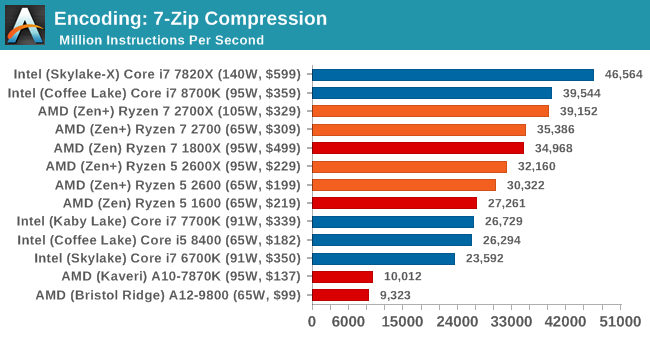
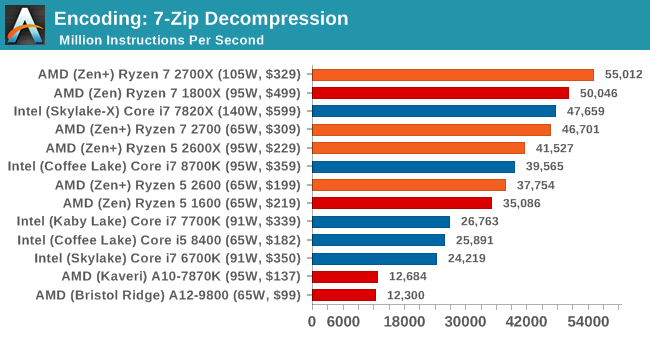
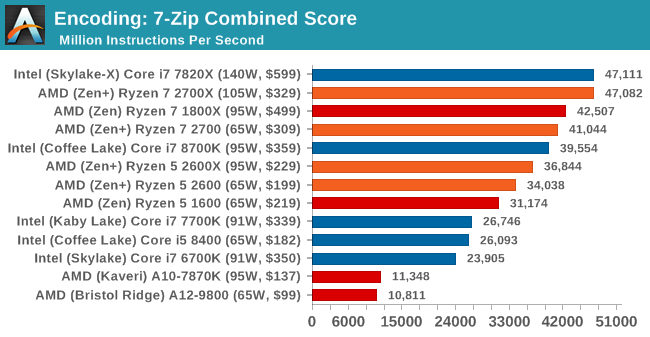
WinRAR 5.40: link
For the 2017 test suite, we move to the latest version of WinRAR in our compression test. WinRAR in some quarters is more user friendly that 7-Zip, hence its inclusion. Rather than use a benchmark mode as we did with 7-Zip, here we take a set of files representative of a generic stack (33 video files in 1.37 GB, 2834 smaller website files in 370 folders in 150 MB) of compressible and incompressible formats. The results shown are the time taken to encode the file. Due to DRAM caching, we run the test 10 times and take the average of the last five runs when the benchmark is in a steady state.
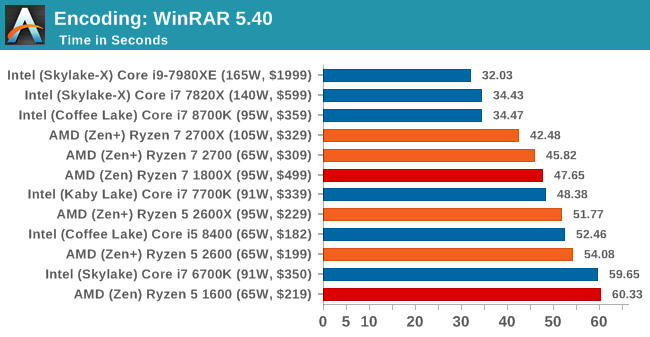
WinRAR requires a good memory base, so we see the quad-channel processors heading up the pack. The high IPC of the Core i7-8700K also does well.
AES Encoding
Algorithms using AES coding have spread far and wide as a ubiquitous tool for encryption. Again, this is another CPU limited test, and modern CPUs have special AES pathways to accelerate their performance. We often see scaling in both frequency and cores with this benchmark. We use the latest version of TrueCrypt and run its benchmark mode over 1GB of in-DRAM data. Results shown are the GB/s average of encryption and decryption.
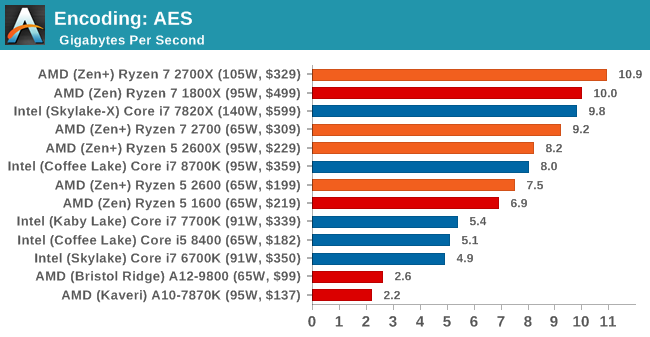
HandBrake v1.0.2 H264 and HEVC: link
As mentioned above, video transcoding (both encode and decode) is a hot topic in performance metrics as more and more content is being created. First consideration is the standard in which the video is encoded, which can be lossless or lossy, trade performance for file-size, trade quality for file-size, or all of the above can increase encoding rates to help accelerate decoding rates. Alongside Google's favorite codec, VP9, there are two others that are taking hold: H264, the older codec, is practically everywhere and is designed to be optimized for 1080p video, and HEVC (or H265) that is aimed to provide the same quality as H264 but at a lower file-size (or better quality for the same size). HEVC is important as 4K is streamed over the air, meaning less bits need to be transferred for the same quality content.
Handbrake is a favored tool for transcoding, and so our test regime takes care of three areas.
Low Quality/Resolution H264: Here we transcode a 640x266 H264 rip of a 2 hour film, and change the encoding from Main profile to High profile, using the very-fast preset.
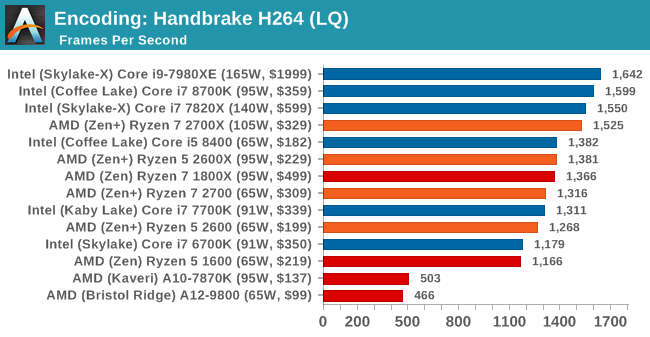
High Quality/Resolution H264: A similar test, but this time we take a ten-minute double 4K (3840x4320) file running at 60 Hz and transcode from Main to High, using the very-fast preset.
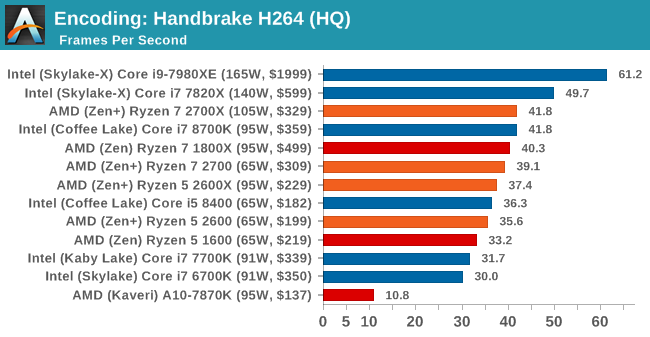
HEVC Test: Using the same video in HQ, we change the resolution and codec of the original video from 4K60 in H264 into 4K60 HEVC.
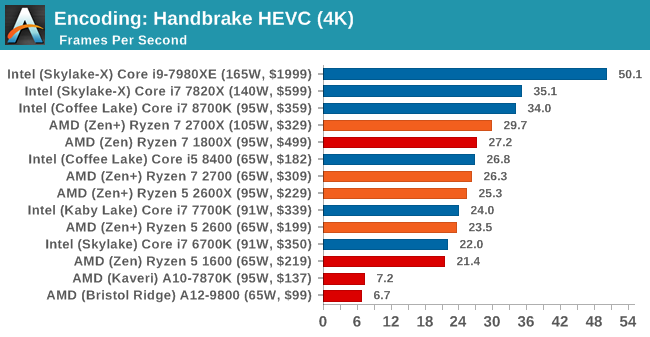
For HandBrake video encoding of large frames, there is a bump with the new Ryzen-2000 series processors over the previous generation, however there is still a gap up to the Core i7-8700K. The Core i5-8400 puts in a good showing here, above all but the best Ryzen parts.










545 Comments
View All Comments
peevee - Thursday, April 26, 2018 - link
I mean, Octane test in Chrome is what V8 javascript compiler does. And it itself is build with MSVC AFAIR.Dragonstongue - Thursday, April 26, 2018 - link
just looking back at this, you say according to title 2700x-2700-2600x-2600 and yet in most tests are only listing the results for 2700x-2600x..not good for someone really wanting to see the differences in power use or performance comparing them head to head sort of speak.seems the 2700 would be a "good choice" as according to the little bit of info given about it, it ends up using less power than the 2600 even though rated same TDP with 2 extra core 4 extra threads O.O
I do "hope" the sellers such as amazon at least for us Canadian folk stick closer to the price they should be vs tacking on $15-$25 or more compared to MSRP pricing, seems if one bought them same day of launch pricing was right where it should be.
1600 has bounced around a little bit whereas 1600x is actually a fair price compared to what it was "very tempting" though the lack of a boxed cooler is not good.....shame 2600 only comes with wraith stealth instead of spire seeing as the price is SOOO close (not to mention at least launch price vs what the 1xxx generation is NOW, AMD should have been extra nice and bundled the wraith spire for 2600-2600x and wraith LED and wraith max or whatever for the 2700-2700x
I would imagine if they decide to do a 4 core 8 thread 2xxx that would be the spot to use the wraith spire (less heat load via less cores type deal)
29a - Thursday, April 26, 2018 - link
Not trying to be sarcastic but will this article be finished? I really wanted to read the storage and chipset info. If the article is as complete as it is going to get please let us know, 20 year reader asking.John_M - Saturday, April 28, 2018 - link
I'm sure it will be finished one day but I agree that it doesn't seem so at the moment. If you want to find out about StoreMI AMD has a page about it: https://www.amd.com/en/technologies/store-miET - Tuesday, May 1, 2018 - link
I think we've got ourselves a race: which will get here first, the missing parts of the 2nd gen Ryzen review, or new Raven Ridge drivers? Or perhaps hell will freeze first.29a - Friday, May 4, 2018 - link
Sadly it appears as though the article will not be finished. This site was great during about its first 15 years of existence, Purch has done a thorough job of purching it up.jor5 - Tuesday, May 8, 2018 - link
Oh dear what an embarrassing end to this article.Tuck it away under "what was I thinking??" and pretend it never happened.
x0fff8 - Wednesday, May 9, 2018 - link
is this article ever gonna get updated with the new benchmarks?MDD1963 - Thursday, May 10, 2018 - link
And just like that, my 7700K is fast again! :)peevee - Thursday, May 10, 2018 - link
"Technically the details of the chipset are also covered by the April 19th embargo, so we cannot mention exactly what makes them different to the X370 platform until then"That was written for the article published April 19th, and as of May 10th STILL in the text.